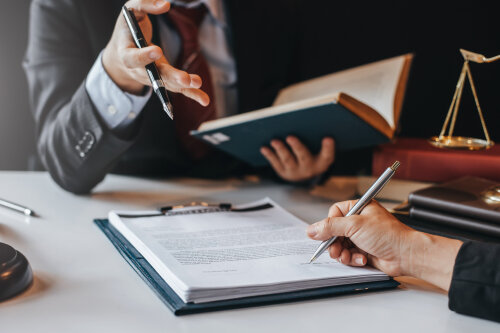Best Collaborative Law Lawyers in Perpignan
Share your needs with us, get contacted by law firms.
Free. Takes 2 min.
Free Guide to Hiring a Family Lawyer
List of the best lawyers in Perpignan, France
About Collaborative Law in Perpignan, France
Collaborative Law in Perpignan, France, is an alternative dispute resolution process that emphasizes cooperation and constructive negotiation over courtroom litigation. In this legal approach, parties involved in a dispute work together with their attorneys and sometimes other relevant professionals (like accountants or psychologists) to reach an amicable settlement that benefits all parties involved. This approach is particularly popular for resolving family law matters such as divorce and custody disputes, offering a more peaceful and respectful resolution compared to traditional litigation.
Why You May Need a Lawyer
There are several situations where you may need a lawyer specializing in Collaborative Law in Perpignan. These include:
- Divorce: When spouses wish to dissolve their marriage without the hostility that can accompany traditional divorce proceedings.
- Child Custody: Parents seeking a harmonious parenting plan for the welfare of their children may benefit from collaborative negotiations.
- Property Settlements: Couples needing to fairly divide assets and debts can benefit from the open and transparent process of collaborative law.
- Business Disputes: Partners or shareholders desiring to resolve disagreements while preserving business relationships.
- Inheritance Conflicts: Families aiming to settle differences amicably following the death of a loved one.
Local Laws Overview
Collaborative Law in Perpignan aligns with broader French legal frameworks while integrating local customs and requirements. Notably:
- According to French law, parties in Collaborative Law must voluntarily participate and demonstrate commitment to reaching a mutual agreement.
- All parties must agree not to pursue litigation during the collaborative process. This creates a conducive environment for honest negotiations.
- The presence of a lawyer for each party is mandatory to ensure that both parties' legal needs and rights are adequately managed.
- Perpignan's Court of First Instance supports alternative dispute resolution methods, integrating legal opportunities to reduce court caseloads.
Frequently Asked Questions
What is the difference between Collaborative Law and mediation?
Collaborative Law involves each party having their own lawyer and possibly other professionals working jointly to reach a resolution, whereas mediation typically involves a neutral third-party mediator helping parties negotiate an agreement.
How long does the Collaborative Law process take?
The duration varies based on the complexity of the issues and the willingness of the parties to cooperate. It tends to be faster than litigation, often concluding in a few months.
Is Collaborative Law cheaper than going to court?
Usually, yes. Collaborative Law avoids lengthy court procedures and trials, resulting in overall reduced legal expenses.
Can Collaborative Law be used for non-family disputes?
Absolutely. It's applicable to a range of civil disputes, including business and probate issues, where maintaining relationships is desirable.
What happens if the parties can't reach an agreement?
If an agreement cannot be reached, parties may proceed to litigation, though the collaborative attorneys are typically not allowed to represent them in court, necessitating new legal representation.
Are the settlements legally binding?
Yes, if the parties reach an agreement, it is formalized into a legally binding contract, which can be enforced by law.
Do I have to go to court if I choose Collaborative Law?
No, the purpose of Collaborative Law is to resolve issues outside of court, eliminating the need for hearings or a trial.
Can Collaborative Law be used if only one party is interested?
Both parties must agree to participate in the collaborative process. It requires mutual interest and commitment to work collaboratively.
What role do lawyers play in Collaborative Law?
Lawyers guide, advise, and facilitate negotiation, ensuring their client's interests and rights are protected throughout the process.
Is everything discussed confidential?
Yes, similar to mediation, discussions in the Collaborative Law process are confidential and cannot be used in court if negotiations fail.
Additional Resources
For those interested in exploring Collaborative Law further, consider these resources:
- Chambre Nationale des Avocats Spécialistes en Droit Collaboratif (CNASDC) for resources and specialist contacts.
- Local Bar Association (Ordre des Avocats de Perpignan) for referrals to qualified Collaborative Law practitioners.
- Mairie de Perpignan for community resources and dispute resolution services.
- Online legal forums and local workshops on harmonizing family and civil disputes.
Next Steps
If you need legal assistance in Collaborative Law, consider the following steps:
- Identify the nature of your legal issue and determine if it is suitable for a Collaborative approach.
- Research and select a qualified Collaborative Law attorney in Perpignan.
- Schedule a consultation to discuss your case and the potential for a collaborative resolution.
- Be open and honest during consultations to ensure a productive dialogue.
- Commit to the process by signing a participation agreement with your attorney and the opposing party.
Lawzana helps you find the best lawyers and law firms in Perpignan through a curated and pre-screened list of qualified legal professionals. Our platform offers rankings and detailed profiles of attorneys and law firms, allowing you to compare based on practice areas, including Collaborative Law, experience, and client feedback.
Each profile includes a description of the firm's areas of practice, client reviews, team members and partners, year of establishment, spoken languages, office locations, contact information, social media presence, and any published articles or resources. Most firms on our platform speak English and are experienced in both local and international legal matters.
Get a quote from top-rated law firms in Perpignan, France — quickly, securely, and without unnecessary hassle.
Disclaimer:
The information provided on this page is for general informational purposes only and does not constitute legal advice. While we strive to ensure the accuracy and relevance of the content, legal information may change over time, and interpretations of the law can vary. You should always consult with a qualified legal professional for advice specific to your situation.
We disclaim all liability for actions taken or not taken based on the content of this page. If you believe any information is incorrect or outdated, please contact us, and we will review and update it where appropriate.









